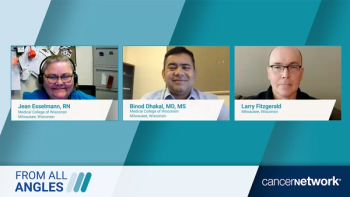
Panelists discuss how the symptoms of a patient with multiple myeloma led to their initial diagnosis and the progression of various treatments they underwent before becoming a candidate for CAR T therapy.

Your AI-Trained Oncology Knowledge Connection!


Panelists discuss how the symptoms of a patient with multiple myeloma led to their initial diagnosis and the progression of various treatments they underwent before becoming a candidate for CAR T therapy.
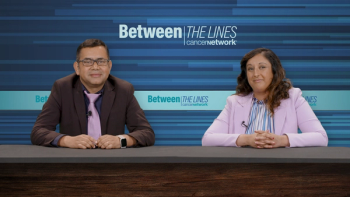
Panelists discuss how looking ahead, key takeaways from the CARTITUDE-4 study underscore the transformative potential of ciltacabtagene autoleucel in managing lenalidomide-refractory multiple myeloma, highlighting its efficacy, safety, and implications for future treatment strategies.
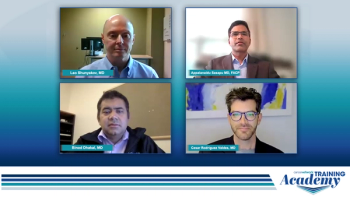
Panelists discuss how addressing unmet needs and future directions for enhancing bispecific therapy care transitions in multiple myeloma requires focusing on standardized protocols, technology integration, personalized patient support, and continuous education for both patients and healthcare providers across academic and community settings.

Panelists discuss how optimizing patient reintegration into community care after receiving bispecific therapy for multiple myeloma at academic centers requires a coordinated, patient-centered approach involving clear communication, standardized transition protocols, ongoing education, and collaborative care models between academic and community oncologists.

Panelists discuss how the safety data from the long-term CARTITUDE-4 update demonstrate a manageable adverse event profile for ciltacabtagene autoleucel, supporting its continued use in patients with lenalidomide-refractory multiple myeloma.

Panelists discuss how enhancing communication between academic and community oncologists during the referral and treatment process for multiple myeloma patients requires a multifaceted approach involving standardized protocols, technology integration, regular collaborative meetings, and shared decision-making to ensure seamless patient care and optimal outcomes.

Panelists discuss how comprehensive long-term monitoring protocols for patients who have received bispecific therapy typically involve regular follow-ups, standardized testing schedules, and clear communication channels between academic centers and community practices to manage potential complications and adverse events.

Panelists discuss how determining a patient's readiness to transition back to community oncology care after bispecific therapy involves assessing multiple factors including treatment response, toxicity resolution, overall stability, and the community practice's capabilities.

Panelists discuss how data from the long-term CARTITUDE-4 update reveal a notable rate of minimal residual disease (MRD) negativity with ciltacabtagene autoleucel, emphasizing its potential to enhance long-term outcomes in patients with lenalidomide-refractory multiple myeloma.

Panelists discuss how referral types for multiple myeloma patients vary widely, including newly diagnosed cases, relapsed/refractory disease, and specific therapy considerations like bispecifics, with processes differing between in-state and out-of-state referrals due to logistical and insurance factors.

Panelists discuss how the evaluation and treatment initiation processes for non-BCMA targeted bispecifics and BCMA-targeted bispecifics share core similarities in patient assessment and care coordination, but differ in specific premedication protocols, dosing strategies, and side effect management.

Panelists discuss how data from the long-term update from CARTITUDE-4 reveal impressive overall response rates (ORRs) and duration of response (DOR) for ciltacabtagene autoleucel, reinforcing its effectiveness in treating lenalidomide-refractory multiple myeloma.

Panelists discuss how academic centers approach the initial consultation and evaluation process for patients referred for bispecific therapy from community practices.

Panelists discuss how transitioning patients with multiple myeloma from community to academic settings faces challenges including communication gaps, differences in treatment approaches, patient reluctance, and logistical hurdles.

Panelists discuss how data from the long-term CARTITUDE-4 study update in multiple myeloma (MM) highlight the sustained efficacy and safety of ciltacabtagene autoleucel, reinforcing its role as a promising treatment option for patients with lenalidomide-refractory disease.

Panelists discuss how patient-specific factors such as disease status, overall health, support systems, and treatment history are crucial considerations when determining readiness for potential transition to community settings for ongoing care.

Panelists discuss how the initial process of identifying and referring potential candidates for bispecific therapy from the community setting to an academic center involves careful patient assessment, clear communication channels, and established referral protocols to ensure timely and appropriate treatment initiation.

Panelists discuss how the CARTITUDE-4 study data provide a comprehensive overview of its design, baseline characteristics, and efficacy outcomes, highlighting the potential of ciltacabtagene autoleucel in improving treatment results for patients with lenalidomide-refractory multiple myeloma.

Panelists discuss how chimeric antigen receptor (CAR) -T-cell therapy has transformed the treatment landscape for relapsed/refractory multiple myeloma (R/R MM), demonstrating remarkable efficacy and offering new hope for patients with limited therapeutic options.

Panelists discuss how multiple myeloma care faces challenges including patient reluctance to seek treatment at academic centers, complex treatment landscapes, and the need for improved coordination between community and academic physicians.

Panelists discuss how collaborative care settings for multiple myeloma patients often lead to improved outcomes compared to non-collaborative approaches, citing factors such as access to specialized expertise, coordinated treatment plans, and comprehensive patient support.

Panelists discuss how streamlining the referral process for multiple myeloma patients can significantly reduce treatment initiation.

Panelists discuss how effective collaboration, care coordination, and communication between academic and community physicians are crucial for ensuring seamless transitions and high-quality care for patients with multiple myeloma.
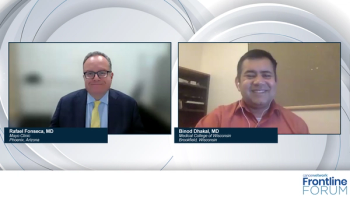
Experts provide concluding insights on CAR-T cell therapy and offer their perspectives on the evolving treatment landscape for multiple myeloma, highlighting potential future directions and innovations in patient care.

A panel of experts examines the impact and potential of CAR T-cell therapy in earlier treatment lines for multiple myeloma, evaluating its efficacy, safety.

Multiple myeloma experts analyze recent developments in transplant-ineligible newly diagnosed multiple myeloma treatment, focusing on the latest updates presented at EHA 2024 and their potential impact on patient care.

Key opinion leaders evaluate the clinical implications of updated data presented at EHA 2024, interpreting how these findings may influence future treatment strategies in multiple myeloma.

Multiple myeloma specialists analyze recent findings presented at EHA 2024, offering expert perspectives on the PERSEUS and IsKIA clinical trials and their implications for patient care.

Medical experts explore the current standard of care and evolving treatment landscape for transplant eligible multiple myeloma, a complex hematological malignancy.
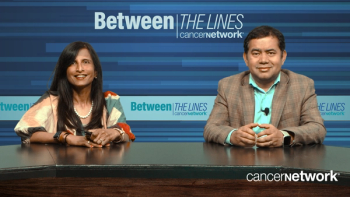
Amrita Y. Krishnan, MD, and Binod Dhakal, MD, discuss the clinical implications of data from MajesTEC-1 and provide key takeaways on the evolving relapsed/refractory multiple myeloma treatment landscape.